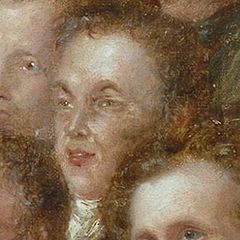John Angell James
| John Angell James | |
|---|---|

in 1840 in the crowd at the conference. To the left is John Howard Hinton and central is James
|
|
| Born | 6 Jun 1785 Blandford Forum |
| Died | 1 Oct 1859 Birmingham |
| Resting place | Witton Cemetery, Birmingham |
| Education | Gosport Academy |
| Occupation | Minister |
| Known for | Writing |
| Successor | Robert William Dale |
John Angell James (6 June 1785 - 1 October 1859), was an English Nonconformist clergyman and writer.
James was born at Blandford Forum. After seven years' apprenticeship to a linen-draper in Poole, Dorset, he decided to become a preacher, and in 1802 he went to David Bogue's training institution at Gosport in Hampshire. A year and a half later, on a visit to Birmingham, his preaching was so highly esteemed by the congregation of Carrs Lane Independent chapel that they invited him to exercise his ministry amongst them; he settled there in 1805, and was ordained in May 1806. For several years his success as a preacher was comparatively small; but he became suddenly popular in about 1814, and began to attract large crowds. At the same time his religious writings, the best known of which are The Anxious Inquirer and An Earnest Ministry, acquired a wide circulation. The Anxious Inquirer sold over 500,000 copies in his lifetime and was translated into more than a dozen languages. This was the book which D. Martyn Lloyd-Jones gave to his wife, Bethan, when she was seeking the Lord. The book was also of great help to Charles Haddon Spurgeon.
In his autobiography Spurgeon wrote: "In an early part of my ministry, while but a lad, I was seized with an intense desire to hear Mr. John Angell James; and, though my finances were somewhat meagre, I performed a pilgrimage to Birmingham solely with that object in view. I heard him deliver a week-evening lecture, in his large vestry, on that precious text, "Ye are complete in Him." The savour of that very sweet discourse abides with me to this day, and I shall never read the passage without associating therewith the quiet but earnest utterances of that eminent man of God."
James was a typical Congregational preacher of the early 19th century, massive and elaborate rather than original. His preaching was very popular and well received by serious Christians of the day. His doctrine was a moderate form of Calvinism, as had been that of Edward Williams, one of his predecessors. He published numerous books on practical subjects of the Christian life, including: The Anxious Inquirer, Pastoral Addresses, an Earnest Ministry, A Help to Domestic Happiness, Female Piety, The Christian Father's Present to His Children, The Young Man's Friend and Guide, and The Widow Directed to the Widow's God. Many of these are still available in print and widely used among Conservative and Reformed Christians in the USA (In England he is largely forgotten). He was one of the founders of the Evangelical Alliance and of the Congregational Union of England and Wales. Municipal interests appealed strongly to him, and he was also for many years chairman of Spring Hill College, Birmingham. He was also an ardent slavery abolitionist, and is portrayed in the huge canvass depicting Clarkson's opening address at the world's first Anti-Slavery Convention in 1840, in the National Portrait Gallery, London. He was a contemporary of William Wilberforce and Charles Simeon.
...
Wikipedia
